Disclosure: Meeple Mountain received a free copy of this product in exchange for an honest, unbiased review. This review is not intended to be an endorsement.
Tales from the Tavern
A group of evil monsters has stolen all the drinks in the land of Barcadia, and now it’s up to your merry band of adventurers to brave the dungeon and recover all the drinks. Or… something like that. Heroes of Barcadia is less about the narrative and more about the laughs and, of course, the drinks. What exactly is it, then?
Well, it’s a dungeon-crawling game for 2-6 players (or up to 8 with the expansion), but unlike many dungeon-crawlers, you’re in direct competition. These other heroes are not your allies; they are your rivals! After all, what good is recovering the lost hoard of stolen drinks if it’s not you getting all the glory? You’ll take turns exploring the dungeon to find power-ups and slay monsters. Once you have three power-ups, you can try to take on the final boss and recover the drink hoard.
As a game, it’s… pretty basic. Heroes of Barcadia keeps the gameplay dead simple. There’s very little room for strategy. The rooms you uncover, the power-ups you get, and the dice you roll to fight the monsters are all random. You have little control over your destiny here. It is less of a game and more of a classed-up, shiny new way to have fun with your friends and get a little buzzed along the way. I’m sure many of us remember the days of grabbing a deck of cards and playing drinking games like King’s Cup in college. This is Rollacrit’s attempt to update that experience for the modern board gamer.
Labyrinths of Libations
The best part of Heroes of Barcadia is, arguably, starting the game. You create a starting point in the middle of the table with the associated hex tiles, and then each player selects a character. Literal pint glasses represent these characters, and they all have laugh-out-loud-worthy names referencing this game’s brand of alcohol-fueled sword and sorcery. My favorite was Merlo the Saucerer, though Tipple the Half-Pint from the Party Pack expansion also got a giggle or two. The characters are essentially the same, though each comes with their own “signature move” they can pull out when certain conditions are met. These are largely what you’d expect: the barbarian does more damage when low on health, the necromancer can come back to life, etc. If pint glasses aren’t your thing, Rollacrit offers 3D printable files representing all the characters on their website.
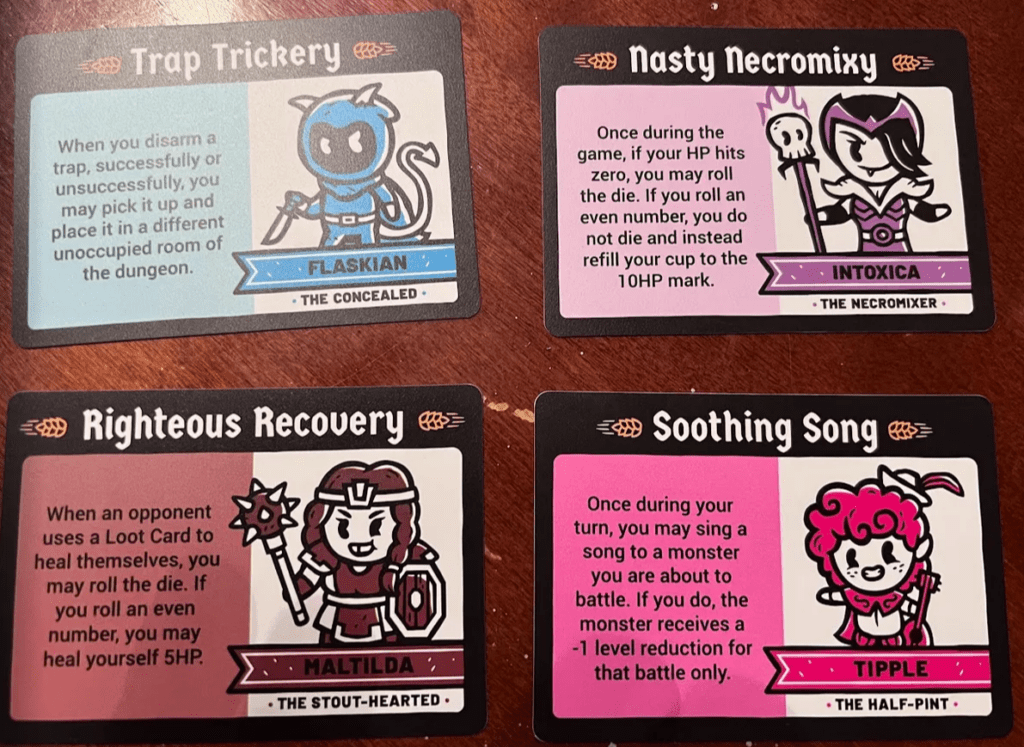
After everyone has selected a character and filled their chosen pint glass, you all begin assembling your dungeon. One at a time, each player takes turns laying a hex facedown to create your group’s dungeon layout. You can build long hallways, loops, or giant, interconnected plaza-type areas, meaning your game board will look unique every time you play the game, which is a neat concept. In practice, I found the hexes didn’t quite line up perfectly when creating longer connected loops, leading to some confusing moments of not being sure if those tiles technically should or shouldn’t be adjacent. Everyone starts with three loot cards, which have various effects that will either help you or screw over your friends at the table. Once that’s all done, each player takes their character’s colorful 20-sided die and rolls to see who goes first.
The turns are simple. In player order, you will take one action each turn. Those actions are either revealing an adjacent room, moving into up to two already-revealed rooms, or attempting to kill the final boss. That’s it! If it sounds like it’s pretty straightforward, it’s because it is. Our games have had no downtime because the options available on your turn are extremely limited. When you discover a new tile, flip it over and see what’s on it. Rarely it’ll be a portal that connects to other portals in the dungeon. If it’s loot or a power-up, congratulations, you get a freebie! Usually, though, you’ll see some flavor of monster that you have to fight.

The monsters all continue the theme of mixing fantasy tropes with alcohol, so you’ll battle with things like the Micro-Brewnicorn or the Jaegermonster. If it’s a regular monster, you’ll roll your d20, add any bonuses from your loot or power-ups, and try to beat the monster’s level. If you win, congratulations! You win the rewards listed on the monster. If you lose, you take the listed amount of damage, tracked by how full your pint glass is. So, get ready to chug some drink if you fail! If it’s a team battle, you’ll bring a friend into combat to get a chance at the loot. If it’s a boss battle, you pick someone else to roll as the boss monster, and they take damage if you beat the boss. Again, rewards are doled out upon a victory, and play proceeds accordingly.
Of course, you can do one final thing on your turn. If you want to get somewhere and another player is in the way, as a “free action,” you can duel another player before taking action. Both players will roll their D20. The higher number wins, and the loser drinks ten hit points from their cup. If the attacker wins, they get to swap places with the defender and continue their turn. I did this liberally and frequently and put quite the target on my back because why not? I don’t care about the swapping places aspect; I care about making my friends drink.
Art and Ale-sthetics
I love the cartoony art style employed by artist Madison O’Neil. To my knowledge, this is his first artist credit on a board game, and I hope he keeps working on them because they’re so gosh darn cute. It nails the goofiness expected from a game like this, from the characters on the pint glasses to the dopey-looking monsters. The whole vibe is reminiscent of the beloved cartoon Adventure Time, which fits very well with the silly world of Barcadia.
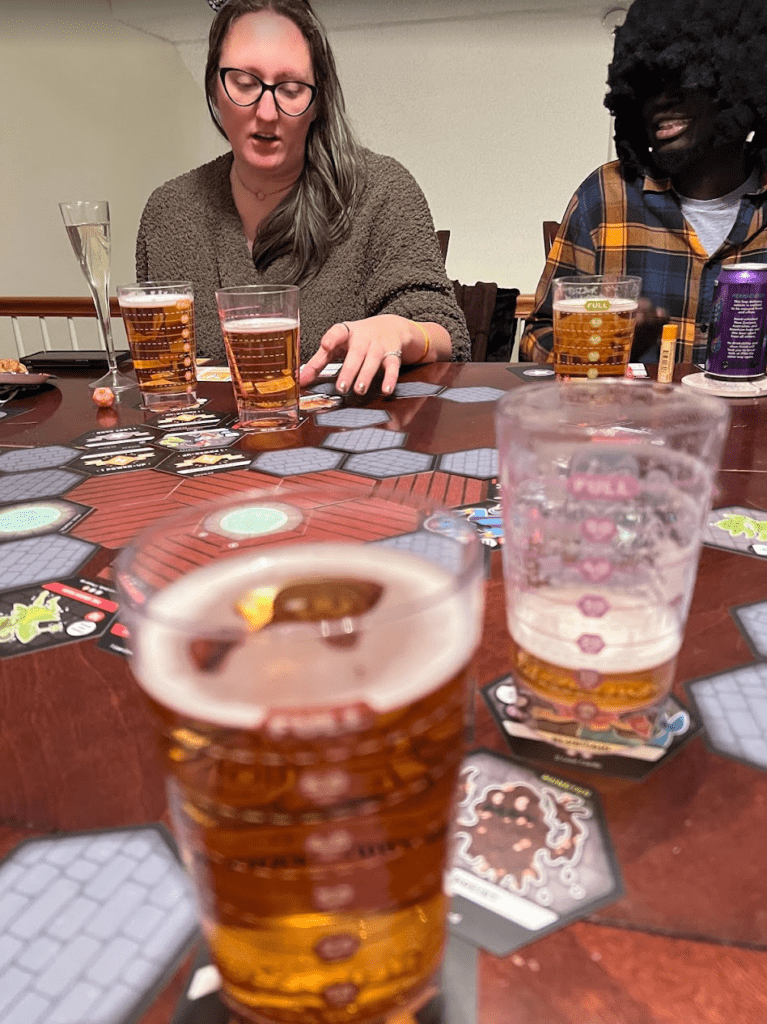
The components are thoughtfully designed for the appropriate audience. The plastic pint glasses have shown no signs of degradation in the artwork through several washes thus far. On that note, this is the first game to fill up my sink with dishes afterward, and that part of it sucks a little bit. It’s not a significant pain point, and all games have some sort of cleanup involved afterward, but it’s something to consider. Beyond the glasses, the game has “traps” that can be placed throughout the dungeon, fashioned like bottle caps. “But Will!” You say, “You didn’t mention the traps earlier!” That is because, in the several playthroughs I’ve had of this game, we only had to put out a trap once. I’m unsure if that’s a statistical aberration, but they had very little presence in my games. It’s a cute addition to the game box, though.
Then we get to the dungeon hex tiles and loot/power-up cards. Rollacrit made the brilliant decision to make all cards and tiles in the game out of PVC to ensure they are 100% waterproof. This was the right call in a game about drinking, where possibly inebriated players will reach across the table to grab their pint glass for a sip. However, there are some tradeoffs with that decision. I find the tiles absolutely infuriatingly impossible to grab off the table. They stick to it, and it’s hard to get a fingernail underneath the edges to flip the cards. Usually, I’d just blame it on my own Shrek-like ogre hands being too clumsy, but it has been a consistent issue with every group I’ve shown the game, and all of them have commented on it. We eventually hacked the system by using our own loot and power-up cards to get underneath the hexes to flip them over, but it’s still a little frustrating to be knocking the hexes all over the place in an effort to flip them.
Party Down
Rollacrit had a specific target audience in mind when they set out to create Heroes of Barcadia. That audience will primarily be “adults with disposable income who still like to catch a buzz occasionally.” If you’re not a big drinker, I cannot recommend this in the slightest. The act of drinking and the environment created by a table of people sitting around getting tipsy and giggling like toddlers at silly fantasy creatures is part of the experience. The physical connection you feel in your real adult human body as you drink from your character’s pint glass is cool! What other board games make the connection between actions taken in the game and your physical state of being?
Obviously, a whole class of drinking games out there can fit that criteria, but Heroes of Barcadia elevates that to a tabletop-worthy experience. I actually recommend this game more to people who want to play with non-board gamers because those are the people who will get the most out of this. Seasoned board game veterans often look for strategic experiences should look elsewhere; there are better games for that (see: almost any of them). It is a game of dumb luck, clever jokes, and belly laughs. There’s virtually no decision-making or strategy present here. You could approximate the experience by having people roll D20s arbitrarily and drinking if it hits below a 10. That’s going to be a nonstarter for most board game players.
But it’s hard to judge this as a standard game. What the team at Rollacrit was angling for was more of an experience. I wouldn’t ever call Tommy Wiseau’s The Room a work of art, but I’ve played the drinking game with friends and had a fantastic time. If I have friends over to play Poker or Euchre, I won’t suggest we change to a game of King’s Cup instead. These are experiences meant to be shared, not games to be mastered. Though I can’t recommend this as a board game, it will stay on my shelf for those rare moments when the vibe is just right. I appreciate that the team at Rollacrit attempted to elevate the college drinking game into a legitimate board game, even if that final experience isn’t everyone’s cup of tea (or glass of beer, as it were).


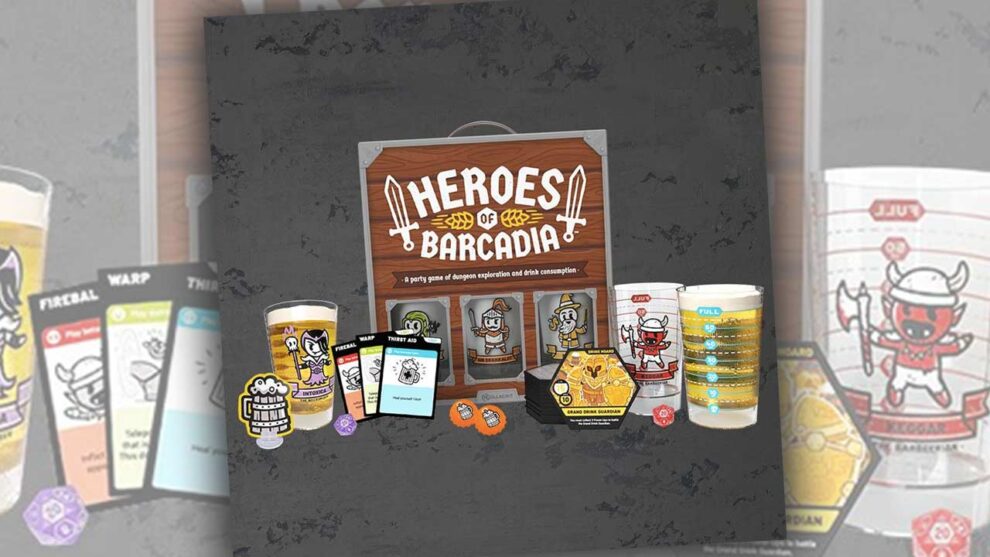

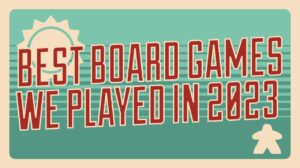
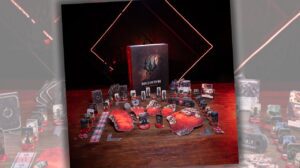
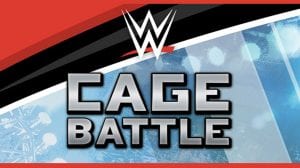





Add Comment